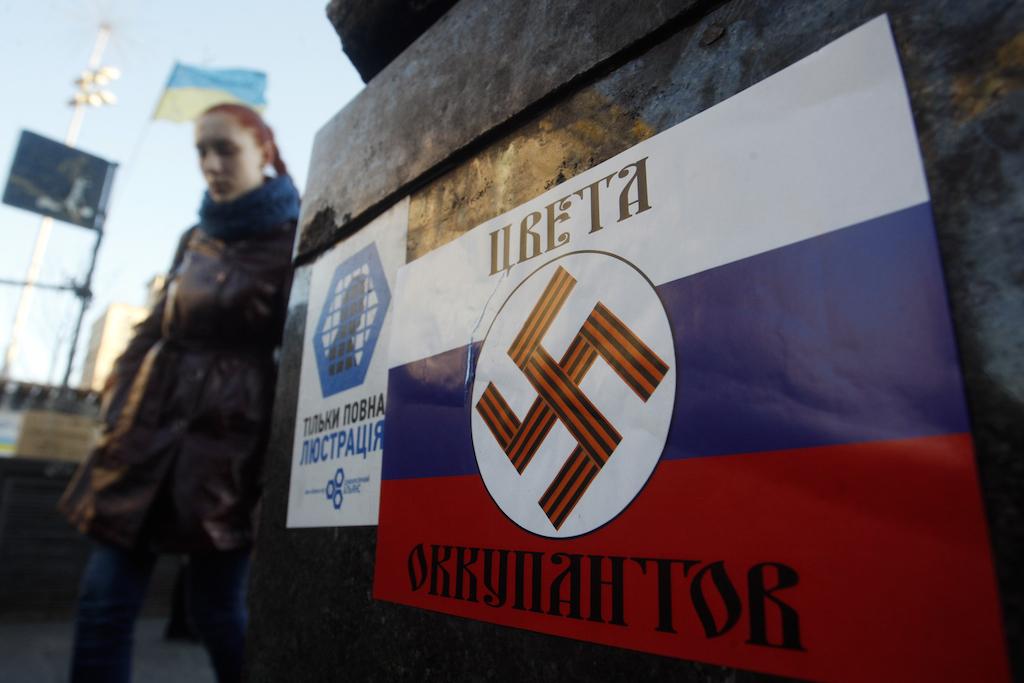It may not be a real war (yet), but don’t tell that to the propagandists in Russia and Ukraine
Both sides are guilty of spin. This photo taken in Independence Square in the Ukraine capital of Kyiv on March 12, 2014, shows a poster with a Nazi swastika overlaid on a Russian flag that says “the colors of the occupiers.”
Tensions are running high ahead of Sunday's referendum to decide whether Ukraine's autonomous region of Crimea stays within the country or secedes and joins Russia. That includes within the sphere of public relations and propaganda, where Kyiv and Moscow are pitting their media against each other.
A group of Ukrainian communications experts formed the Ukraine Crisis Media Center earlier this month, aiming to counteract the propaganda that Russia has been putting out about the Ukraine crisis and Crimea.
The center is run from the Ukraine Hotel in Kyiv, which served as a makeshift field hospital and morgue during last month’s deadly clashes between anti-government protesters and riot police.
Those involved in the project have volunteered their services and said they planned to go back to their normal jobs once the crisis is over.
More from GlobalPost: In Kyiv, fear of war mixes with frustration over lack of action
“We set it up as a platform in which Ukraine can amplify its voice in the international dialogue,” Nataliya Popovych, president of Public Relations Partnership — one of about 10 firms involved in the project — was quoted as saying.
“Given that it’s not just a usual war but an information war, we felt that our skills and knowledge could be useful in this interim time to help Ukraine be heard."
Even fashion designers have joined the "war," holding an event with the media center Thursday to declare that they will forge ahead with the previously planned Ukrainian Fashion Week, opening Friday.
Russia has a "very strong voice" in international media, especially after the Sochi Olympics, Popovych said — while the interim government that took over from Ukrainian President Viktor Yanukovych is "very new" and "still [doesn't have time] to properly set up all of the communications functions."
The center organizes press conferences with representatives of the newly formed government, community leaders and activists. It also helps foreign journalists with interviews and trips to other cities.
The group is active on social media, with accounts on Facebook, Twitter, Google+ and YouTube.
With no government funding, the center relies on donations from US billionaire George Soros’s pro-democracy group International Renaissance Foundation to cover the rent for the hotel space, according to The Globe and Mail.
More from GlobalPost: Postcard from Sevastopol: Where it's not safe to be pro-Ukraine
On the other side of the PR battle, the Russian government’s well-oiled propaganda machine has gone into overdrive.
The New York Times described Moscow’s efforts to control the message about its intervention in Crimea as “breathtaking, even by Soviet standards.”
State-run television has used twisted facts and doctored images to sway public opinion, while access to more than a dozen Ukrainian websites has been blocked. Russia's leading Channel 1, for one, aired a report over the weekend that Ukrainains were fleeing for Russia in droves:
Some prominent voices in Moscow, both earnest and sarcastic, have chimed in on the theater. Liberal Russian politician Vladimir Ryzhkov tweeted: "Old quotation: 'The first casualty of war is the truth.' That's exactly right."
Russian TV journalist Nikita Belogolovtsev added: “'Ukraine's political life is turning into a farce,' says Putin, having arrested [opposition leader Alexei] Nalalny and switched off independent television. But the tactics appear to be working.
A survey conducted by state-run polling agency VTsIOM on March 1 and 2, just as Russian forces were seizing control of key infrastructure in Crimea, found that 71 percent of respondents believed Moscow should make more of an effort to protect the interests of Russian-language speakers in Crimea.
The same poll also found more than 67 percent of respondents approved of Russian President Vladimir Putin's job performance.
Outside of Russia, however, Moscow’s message hasn’t been getting through as it normally might.
An American company that has been handling public relations for Russia in the United States for the past eight years has sought to distance itself from the Ukrainian crisis.
Reuters reported that Ketchum, a division of Omnicom Group, issued a statement saying: "We are not advising the Russian Federation on foreign policy, including the current situation in Ukraine."
More from GlobalPost: Some things you should know about RT, Russia's state-funded news network
The story you just read is accessible and free to all because thousands of listeners and readers contribute to our nonprofit newsroom. We go deep to bring you the human-centered international reporting that you know you can trust. To do this work and to do it well, we rely on the support of our listeners. If you appreciated our coverage this year, if there was a story that made you pause or a song that moved you, would you consider making a gift to sustain our work through 2024 and beyond?
